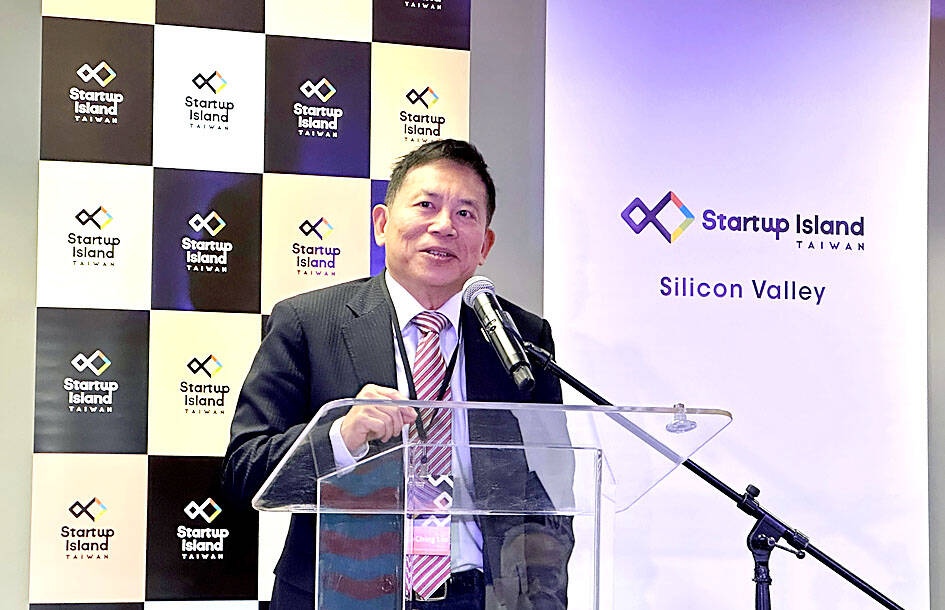Taiwan has established an office in Palo Alto, one of the principal cities of Silicon Valley in California, aimed at helping Taiwanese technology start-ups gain global visibility, the National Development Council said yesterday.
The “Startup Island Taiwan Silicon Valley hub” at No. 299 California Avenue is focused on “supporting start-ups and innovators by providing professional consulting, co-working spaces, and community platforms,” the council said in a post on its Web site.
The office is the second overseas start-up hub established by the council, after a similar site was set up in Tokyo in September last year.

Photo: CNA
Representatives from Taiwanese start-ups, local businesses and venture capitalists attended a launch event at the Sheraton Palo Alto Hotel on Monday evening, council promotional materials showed.
Speaking at the launch, National Development Council Minister Paul Liu (劉鏡清) said the hub would showcase Taiwan’s strengths in the fields of semiconductors and artificial intelligence (AI), while also helping Taiwanese start-ups connect with global opportunities.
In addition to “nurturing more than 100 start-ups” this year, the hub would also attempt to encourage “at least 2,000 talented individuals” to return to Taiwan, Liu said.
The minister highlighted Taiwan’s key position in the global technology industry, citing Taiwan’s “about 90 percent” market share in the semiconductor industry and “more than 90 percent” market share in the AI server industry.
While global start-up funding declined by nearly 40 percent last year compared with 2023, Taiwan’s start-up funding grew by 10 percent to reach a record high of NT$2.8 billion (US$84.9 million), he said.
Liu also said at the event that US technology company Nvidia Corp would establish its “Asia headquarters” in Taipei, which is expected to employ about 2,500 workers.
Nvidia has not yet announced where it might establish such a site, although Nvidia chief executive Jensen Huang (黃仁勳) had previously indicated that the company was looking for more office space in Taipei.
Also speaking at the launch, Dennis Liu, director of the US hub, said the site is aiming to provide a “bridge” between Taiwan and the US, while showcasing Taiwan’s technology capabilities.
Steven Su (蘇育民), chief executive of Taiwanese AI tech start-up Ubestream Inc (環球睿視), said that the council’s hubs in Palo Alto and Tokyo are “a great blessing” for Taiwanese start-ups.
Su urged the government to provide financial aid to help Taiwanese start-ups mitigate the costs of higher overseas rents, which he said are a heavy burden for new start-ups.

CHAOS: Iranians took to the streets playing celebratory music after reports of Khamenei’s death on Saturday, while mourners also gathered in Tehran yesterday Iranian Supreme Leader Ayatollah Ali Khamenei was killed in a major attack on Iran launched by Israel and the US, throwing the future of the Islamic republic into doubt and raising the risk of regional instability. Iranian state television and the state-run IRNA news agency announced the 86-year-old’s death early yesterday. US President Donald Trump said it gave Iranians their “greatest chance” to “take back” their country. The announcements came after a joint US and Israeli aerial bombardment that targeted Iranian military and governmental sites. Trump said the “heavy and pinpoint bombing” would continue through the week or as long

TRUST: The KMT said it respected the US’ timing and considerations, and hoped it would continue to honor its commitments to helping Taiwan bolster its defenses and deterrence US President Donald Trump is delaying a multibillion-dollar arms sale to Taiwan to ensure his visit to Beijing is successful, a New York Times report said. The weapons sales package has stalled in the US Department of State, the report said, citing US officials it did not identify. The White House has told agencies not to push forward ahead of Trump’s meeting with Chinese President Xi Jinping (習近平), it said. The two last month held a phone call to discuss trade and geopolitical flashpoints ahead of the summit. Xi raised the Taiwan issue and urged the US to handle arms sales to

BIG SPENDERS: Foreign investors bought the most Taiwan equities since 2005, signaling confidence that an AI boom would continue to benefit chipmakers Taiwan Semiconductor Manufacturing Co’s (TSMC, 台積電) market capitalization swelled to US$2 trillion for the first time following a 4.25 percent rally in its American depositary receipts (ADR) overnight, putting the world’s biggest contract chipmaker sixth on the list of the world’s biggest companies by market capitalization, just behind Amazon.com Inc. The site CompaniesMarketcap.com ranked TSMC ahead of Saudi Aramco and Meta Platforms Inc. The Taiwanese company’s ADRs on Tuesday surged to US$385.75 on the New York Stock Exchange, as strong demand for artificial intelligence (AI) applications led to chip supply constraints and boost revenue growth to record-breaking levels. Each TSMC ADR represents

Pro-democracy media tycoon Jimmy Lai’s (黎智英) fraud conviction and prison sentence were yesterday overturned by a Hong Kong court, in a surprise legal decision that comes soon after Lai was jailed for 20 years on a separate national security charge. Judges Jeremy Poon (潘兆初), Anthea Pang (彭寶琴) and Derek Pang (彭偉昌) said in the judgement that they allowed the appeal from Lai, and another defendant in the case, to proceed, as a lower court judge had “erred.” “The Court of Appeal gave them leave to appeal against their conviction, allowed their appeals, quashed the convictions and set aside the sentences,” the judges